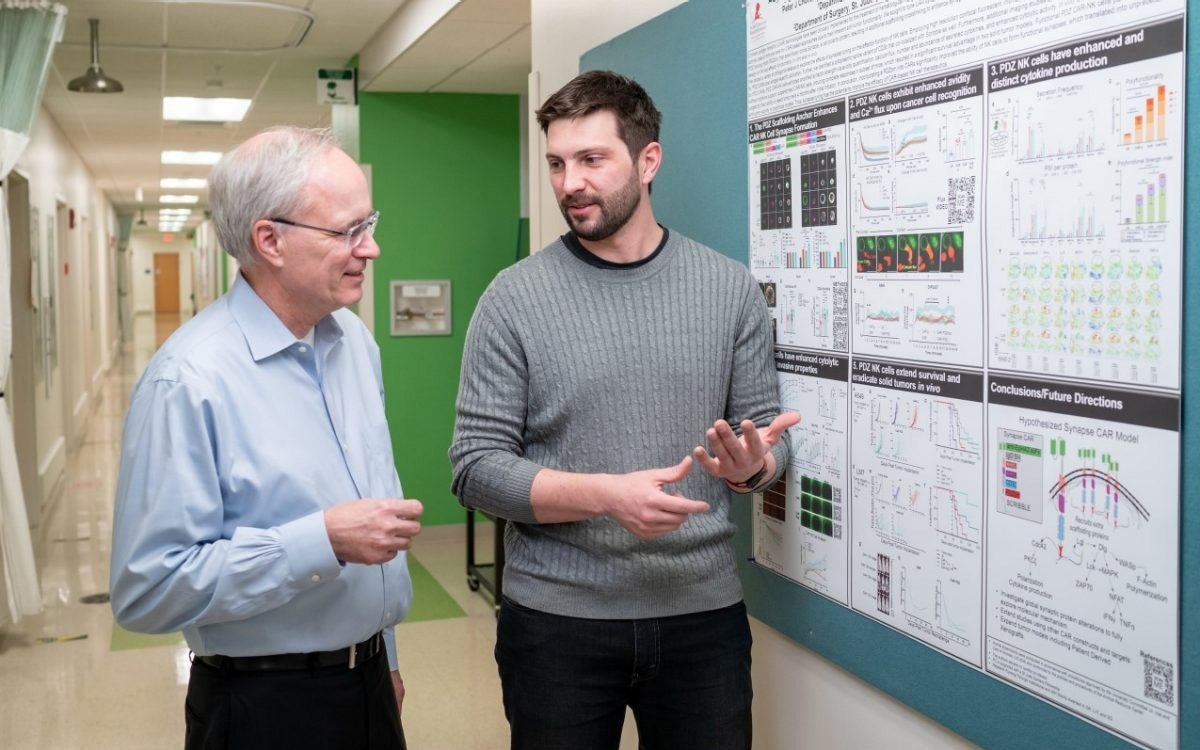Cellular immunotherapies can be substantially more successful if the essential protein that detects cancer is given a molecular anchor. Researchers at St. Jude Children’s Research Hospital discovered that immune cells with the attached protein boosted the killing of cancer, irrespective of the kind of cancer cell or the type of cancer being targeted.
 Senior author Stephen Gottschalk, M.D., (left) and corresponding author Peter Chockley, Ph.D., (right) both of the St. Jude Department of Bone Marrow Transplantation and Cellular Therapy. Image Credit: St. Jude Children’s Research Hospital
Senior author Stephen Gottschalk, M.D., (left) and corresponding author Peter Chockley, Ph.D., (right) both of the St. Jude Department of Bone Marrow Transplantation and Cellular Therapy. Image Credit: St. Jude Children’s Research Hospital
The innovative idea for enhancing CAR-based immunotherapies is called the molecular anchor concept. Although CARs have shown some promise in the clinic, they have not really achieved broad success in treating all tumor types. The findings were published in Nature Biotechnology on February 2nd, 2023.
We have come up with a new way to more efficiently and effectively bind and target cancer cells. The anchor domain design is modular and universal. We showed it worked in multiple CARs and multiple immune cell types—including both Natural Killer (NK) and T cells.”
Peter Chockley, PhD, Postdoctoral Research Associate, Department of Bone Marrow Transplantation and Cellular Therapy, St. Jude Children’s Research Hospital
Engineered CAR proteins can be added to the surface of human immune cells to direct them to attack cancer cells. For some tumors, such as relapsed leukemia, CAR T cells have shown some success in the clinic. However, CAR T cells have not been as effective in treating solid tumors, partially owing to the issues with immune cell activation.
The St. Jude team discovered a method to “anchor” the CAR molecule inside immune cells, making it simpler for the cells to activate and destroy cancer than traditional CARs. In animal models of various tumor types, including lung, bone, and brain tumors, the anchored CARs improved survival.
The anchor domain discovery is easily translatable into early phase clinical testing. It does not require any other new technology. We strongly believe that this approach needs to get tested in the clinic because no one has tried it before, and it looks very promising in our preclinical work.”
Stephen Gottschalk, MD, Chair, Department of Bone Marrow Transplantation and Cellular Therapy, St. Jude Children’s Research Hospital
Carefully structured CARs kill cancers better
CARs are a vital chemical in the fight against cancer. The molecule’s exterior detects a protein in the cancer cell. The immune synapse, which is formed between the two cells as a result, is a complex of chemicals and proteins.
The CAR component inside the immune cell begins to receive signals from the CAR components outside the cell after the immune synapse has been established. Although these complicated exchanges can be challenging for normal CAR T and NK cells to understand, they serve as the “go” signal to activate and destroy the cancer cell.
Chockley added, “Our approach is different because it focuses on organization. CAR immune cells form synapses that are very disorganized. The anchoring domain we added organizes internal scaffolding proteins and makes a better synapse, and then brings in other extant signaling proteins. The simple addition of organization improves CARs dramatically.”
Imagine the tangled mess of connections and cords on the back of a desktop computer. Untangling the wires and connections is necessary for CAR activation before adding a monitor. It might be really challenging if the cables are not arranged. A procedure that would have taken hours becomes simple if the wires have been arranged properly.
Conventional CARs cause delayed signaling within the cells by forming an immune synapse that looks chaotic, like a desk covered with cords. The scientists ordered the CARs by including an anchoring domain on the bottom side of the CAR, which is the molecular equivalent of including cable ties to arrange computer connections.
An attractive approach to improve any CAR system
Gottschalk further stated, “The most attractive thing about this approach is that you can add the anchor domain to any CAR or other antigen-specific receptor you like. The engineering is simple and easily translatable to a broad range of cellular immunotherapies that are currently being developed.”
By adding a particular four amino acid sequence to the end of the standard CAR, the researchers were able to add the molecular anchor. The protein Scribble, which is involved in signaling and attachment to the cellular scaffolding, was then formed from these amino acids.
An immunologist working on CARs might not be as familiar with the proteins, amino acids, and signaling involved as someone who works with skin (epithelial) cells.
At least three distinct primary disciplines had to be combined to make the finding, and Chockley is an expert in all of them. His research demonstrates how the development of CAR-modified cells might greatly benefit from attention to other basic scientific domains to discover new ways to arrange and modify the immune synapse.
Chockley concluded, “There is a lot more to an immune cell-cancer cell interaction than we have been working with. We are entering a new design realm with this domain. We have plenty to do and explore now.”
Source:
Journal reference:
Chockley, P. J., et al. (2023). Synapse-tuned CARs enhance immune cell anti-tumor activity. Nature Biotechnology. doi.org/10.1038/s41587-022-01650-2